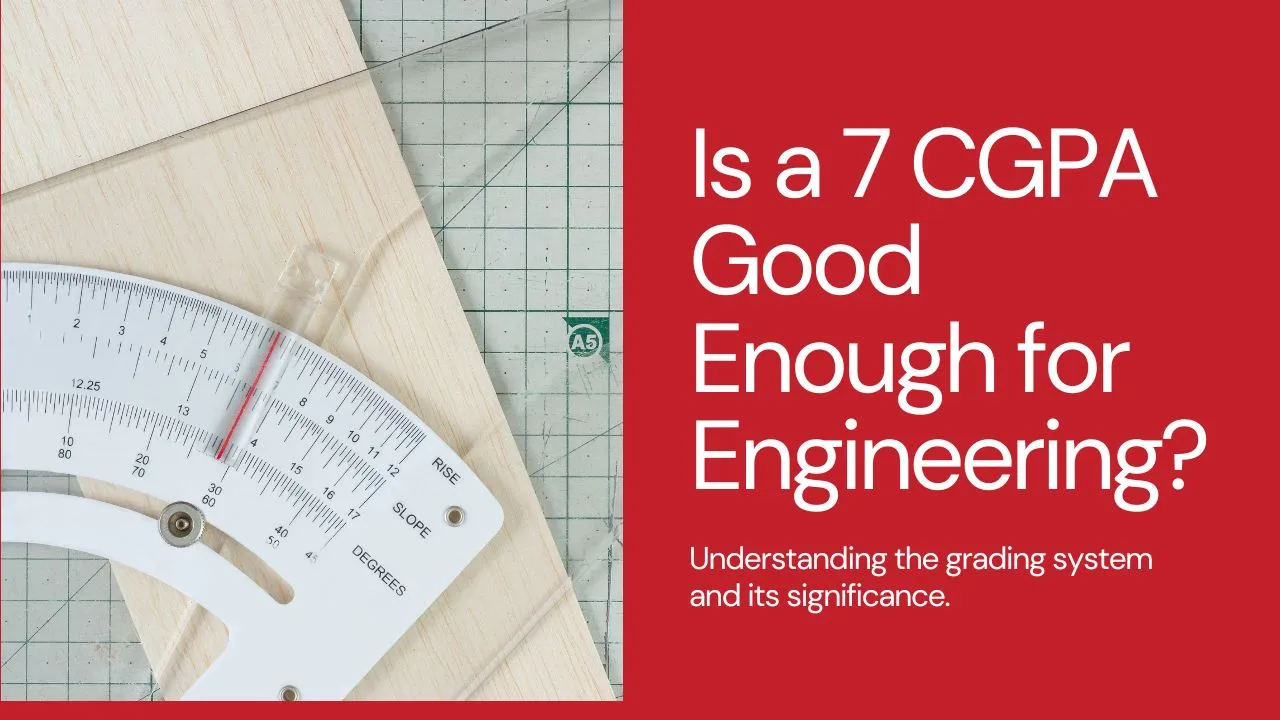If you’re an engineering student, you’ve likely wondered, “Is a 7 CGPA good?” The short answer is: it depends. In the competitive world of engineering, a 7 CGPA can be considered good by some standards but may require improvement by others. This blog post will delve into what a 7 CGPA signifies, how it impacts your academic and career prospects, and strategies to improve it if necessary.
What Does a 7 CGPA Mean?
A CGPA (Cumulative Grade Point Average) is a numerical representation of your overall academic performance. It is calculated on a scale of 0 to 10. A CGPA of 7 translates to a B grade or roughly 70-79%.
General Perception
- Academic Institutions: Some universities and colleges consider a 7 CGPA satisfactory. It shows a decent understanding of the subject matter and consistent performance.
- Employers: Many companies look for a CGPA of 6.5 or above when hiring fresh graduates. Thus, a 7 CGPA meets the minimum requirement for most entry-level positions.
- Higher Education: For students aspiring to pursue postgraduate studies, a 7 CGPA is generally acceptable, though competitive programs might prefer higher CGPAs.
Impact on Career Prospects
1. Job Opportunities
- Entry-Level Jobs: With a 7 CGPA, you qualify for many entry-level positions in engineering firms. Employers often prioritize practical skills and experiences, such as internships and projects, alongside academic performance.
- Competitive Exams: A 7 CGPA is usually sufficient for eligibility in competitive exams like GATE (Graduate Aptitude Test in Engineering) in India, which is essential for securing jobs in public sector undertakings (PSUs) or admission into premier institutions for higher studies.
2. Higher Education
- Postgraduate Studies: For admission to reputed institutions like IITs, NITs, or international universities, a 7 CGPA might meet the eligibility criteria. However, to strengthen your application, you may need good GATE scores, research papers, and strong letters of recommendation.
- Scholarships: While some scholarships are CGPA-specific, many also consider extracurricular achievements, leadership qualities, and community service. A 7 CGPA, combined with a well-rounded profile, can still make you a strong candidate for various scholarships.
How to Improve Your CGPA
If you feel a 7 CGPA might limit your opportunities, here are some strategies to improve it:
1. Effective Study Techniques
- Active Learning: Engage with the material through discussions, group studies, and teaching concepts to others.
- Regular Reviews: Periodically review your notes and textbooks to reinforce your understanding and retention of the material.
- Utilize Resources: Make use of online resources, reference books, and tutorials to gain different perspectives on challenging topics.
2. Time Management
- Prioritize Tasks: Focus on high-impact activities and allocate specific times for studying, assignments, and revisions.
- Avoid Procrastination: Develop a study schedule and stick to it, breaking tasks into manageable chunks to avoid last-minute cramming.
3. Seek Help When Needed
- Tutoring and Mentoring: Don’t hesitate to seek help from professors, peers, or professional tutors if you’re struggling with specific subjects.
- Study Groups: Join or form study groups where you can collaborate and learn from fellow students.
4. Extracurricular Activities
- Balanced Approach: While improving your CGPA is important, participating in extracurricular activities can enhance your resume and provide a holistic educational experience.
Conclusion
A 7 CGPA in engineering is generally considered good and opens up various opportunities in both the job market and higher education. However, it is essential to balance academic performance with practical experience and extracurricular activities to build a well-rounded profile. If you aim to improve your CGPA, implementing effective study techniques, managing your time wisely, and seeking help when needed can significantly enhance your academic standing.
Ultimately, your CGPA is just one aspect of your academic and professional journey. Focus on developing a comprehensive skill set, gaining practical experience, and building a strong network to achieve your career goals.

